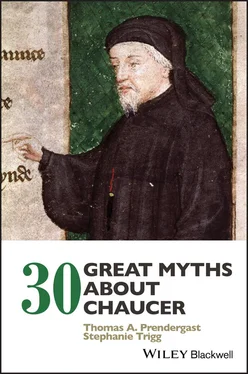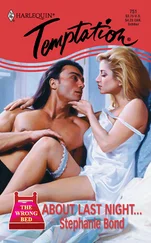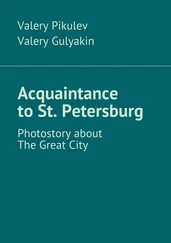Library of Congress Cataloging‐in‐Publication Data
Names: Prendergast, Thomas A. (Thomas Augustine), author. | Trigg, Stephanie, author.
Title: 30 great myths about Chaucer / Thomas A. Prendergast and Stephanie Trigg.
Other titles: Thirty great myths about Chaucer
Description: Hoboken, NJ : Wiley, 2020. | Includes bibliographical references and index.
Identifiers: LCCN 2019051841 (print) | LCCN 2019051842 (ebook) | ISBN 9781119194057 (paperback) | ISBN 9781119194064 (adobe pdf) | ISBN 9781119194071 (epub)
Subjects: LCSH: Chaucer, Geoffrey, ‐1400. | Chaucer, Geoffrey, ‐1400–Criticism and interpretation.
Classification: LCC PR1905 .P68 2020 (print) | LCC PR1905 (ebook) | DDC 821/.1–dc23
LC record available at https://lccn.loc.gov/2019051841LC ebook record available at https://lccn.loc.gov/2019051842
Cover Design: Wiley
Cover Image: Harl 4866 f.88 Portrait of Chaucer, from the poem ‘Regement of Princes’ by Thomas Hoccleve (c.1368‐1426) (vellum), English School, (15th century)/British Library, London, UK/Bridgeman Images
We would like to express our gratitude to Helen Hickey and Anne McKendry, who have provided their customary efficient and thoughtful assistance with the research that sits behind this book, and who helped us with careful formatting and sub‐editing. Thanks, too, to our editor at Wiley‐Blackwell, Richard Samson, to Pilar Wyman who prepared the index, and to the anonymous readers who helped us shape the book’s structure.
Most of all, of course, we would like to thank each other.
INTRODUCTION: MYTHICAL CHAUCER
A roly‐poly, slightly chubby poet gets up early in the morning to go and pick daisies, or falls asleep while reading a book and dreams about gardens, forests, birds and beautiful women. He makes a pilgrimage to Canterbury with a bunch of rogues and sinners he describes in affectionate and loving terms. He narrates and translates other people’s stories, but he is a wildly original poet, and more or less single‐handedly invents the English language. He is knowing and cynical about human failure, but also childishly enthusiastic about all forms of human endeavor. His poetry is outrageously bawdy and full of fart jokes and he is a profoundly pious religious thinker, while also being guilty of anti‐Semitism. His poetry is utterly imbued with medieval culture, but he is also way ahead of his time in his anticipation of our own concerns. His poetry is some of the greatest in the English language, but is also too difficult to read. Chaucer himself is wise and cynical, but his achievement was limited by medieval ignorance and superstition, just as his sympathetic respect for women was restricted by patriarchal ideologies. He is praised as a genius in his own time and has variously been celebrated as a satirist, a reformer, a lyricist, a pre‐Shakespearean lover of bawdy, a sentimentalist, a religious apologist, a humanist, a feminist, a post‐modernist and a queer theorist.
And so it goes. Chaucer’s long reception history is a contradictory mess of changing opinions and ideas about the character of the medieval poet, the nature of his poetic achievement and the interpretation of his poetry. These aspects of his history are so interwoven it can be quite difficult to untangle critical readings of his works from ideas about the medieval poet himself. And nor are these debates confined to the past alone.
All the volumes in this series bring literary history, reception and cultural studies into conversation. They acknowledge that we necessarily approach the writing of well‐known authors with expectations heavily mediated by earlier readers and shaped by a range of expectations that may be based only loosely on historical fact. These expectations shape our choice of which poems to read, how we edit and teach them and, in the case of Chaucer, what we think about the Middle Ages and the meaning of that past for contemporary culture.
In the case of our 30 Great Myths About Chaucer , we are also contending with the extremely complex phenomenon of medievalism. That is, in addition to the myths about Chaucer that emanate mostly from the world of literature, there are many associated “myths” about the Middle Ages that color and inflect the reception of Chaucer. Many of these myths implicitly posit the idea that medieval people and culture were somehow discontinuous with the modern present; as if they inhabited a different world from the social and cultural forms that produced the realist novel, for example, or the poetry of the romantic movement. The medieval past has been profoundly shaped – in both the scholarly and the popular imagination – as an era substantially different from modernity in areas of religious, artistic and political practice and knowledge, to say nothing of social forms, health sciences, costume, dress and the like. A separate volume, entitled something like “30 Great Myths about the Middle Ages,” would be easy to write. No, medieval people did not think the earth was flat; no, women did not wear chastity belts; and no, medieval intellectual life was not stifled by superstition or religious repression. 1
One of the dominant features of much study in the field of medievalism is the pleasant pastime of “correcting” these and other mistakes, or anachronisms in the popular representation of the Middle Ages in fiction and film. We have written elsewhere about the nature of this pleasure, and its implications for both the professional and the amateur study of the medieval past. 2 In the case of literary history, however, and the reception of a poet like Chaucer, the situation is a little more complex. We can certainly appeal to the “facts,” as we know them from the surviving, albeit partial, records of his life and employment, but we are often talking about the interpretation of literary works where of course, we are on much more shaky ground.
We will find with many of these “myths” that they arise from tiny suggestions in the poems or in the life‐records, hints that have generated beliefs and assumptions that have then shaped the traditions of critical interpretation. It is a pattern that is very familiar from the archives of medievalism.
As with other books in this series, “myth” here does not mean (as it often does) a widely shared, structurally enabling fiction that subtends every aspect of modern life. Rather, it conveys a more localized conception (or misconception) about an author or group of authors. Some of these myths are more deeply held familiar ideas about Chaucer and his works than others; and some have larger grains of truth to them than others. Nearly all, however, are the products of the long history of reading Chaucer’s works for over six hundred years and the intertwined history of biography, criticism and popular culture. Many of our chapters consider the relationship between what we know about Chaucer from external records and what he appears to tell us in his fictions. These stories embrace a range of genres and styles, and in the Canterbury Tales at least, they are voiced by a range of distinctive narrators such as the Pardoner, the Wife of Bath and the Prioress. Such is Chaucer’s mastery of the middle style, in the fearful, lovelorn narrators of The Book of the Duchess and The Parlement of Foules , or the nostalgic romantic with an interest in philosophy in Troilus and Criseyde and the more personal poems addressed to his friends, that it is hard not to compile a relatively coherent composite picture of Chaucerian voice and attitudes. But the external “life‐records” tell us a different story again: these are records of payments, permissions to travel, notices of court cases, grants of clothing and annuities to himself and his family. We need to emphasize that there is no written, textual or documentary allusion to Chaucer as a poet, outside his own writings, from his own lifetime. The witnesses to his life and influence as a writer are entirely posthumous.
Читать дальше












